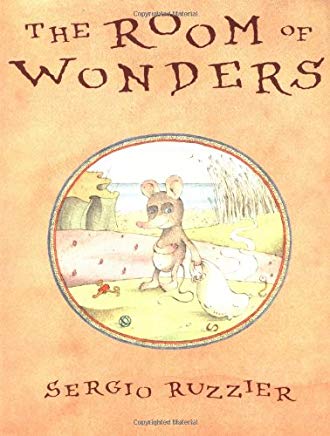The Blog
Blog Entry
Room With a View

Sergio Ruzzier: You may remember wondering, Where can I get a name like that? This was probably while reading More Mole Stories (with text by Lore Segal) which always struck me as a logical next step once you have memorized every single word of Frog and Toad. They’re short that way, and cozy, a little unsurprising, with deadpan, curly illustrations which always seem to promise something more.
That something becomes unmistakable in Ruzzier’s The Room of Wonders, which is proudly the story – and product – of a singular vision. Here are Ruzzier’s words to go with his polyglot community – bugs and pigs and snakes and birds – and improvisatory landscapes. The Room of Wonders of the title turns out to be a place where all of the little junk that seemed randomly scattered across those earlier stories is finally collected for viewing. Here Pius Pelosi is the pack rat, literally, and he’s got a story to go with every discovery – from buttons to pictures, sea glass to glass eyes, lost keys to undelivered letters - even if he has to make it all up. This is a magnificent accumulation of history either way: the collection ends up defining the collector rather than the other way around.
Still, what happens when you cannot explain the value of a thing? Does it – do you – become incrementally less worthy? The centerpiece of Pius’s collection is a little gray pebble which he keeps under glass between all of the rows of exotica: urchins and coral, pieces of statues, a worm in a bottle, and a desiccated leaf in the shape of a dog, to name just a few. The room is well lit and impeccably conceived, with harlequin tiling and a view through the window of the sort of rolling Tuscan topography that most of us are resigned to only seeing in movies. Pius isn’t even charging admission.
And yet it’s that inexplicable little pebble which insists on the visitors’ scrutiny – even scorn:
“It’s an eyesore. It spoils the whole collection. You should get rid of it,” is the general consensus, but who cares what everyone thinks when you have probably done all of this wondering already for yourself?
Well, Pius does briefly, and regrets it. This speaks to our endless, and sometimes traumatic reinventions, and may sound like some pretty heady stuff for a kid’s book, I know, yet it’s the older among us who could probably use an occasional reminder. There are everywhere the wonders – and existential conveniences – of synergistic thinking, but they are nothing compared to the unquenchable barrenness of suddenly not making sense to ourselves.

